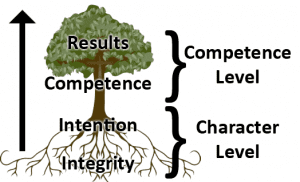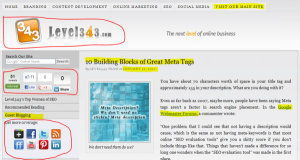What is the purpose of your website? Actually, let’s ask this question a different way. Do you have a section on your site dedicated to informing your visitors about your topic? This blog is a good example; we use the Level343 SEO Article Archive for all things online marketing. Each blog post is an additional “book” in our library dedicated to online marketing.
Creating a repository of information specific to [your topic] has several benefits, such as:
- Increased ability to rank for terms relevant to [your topic]
- Increased authority
- Increased publicity
- Increased trust
- Increased online citations
- Increased ability to generate leads
The big asterisk next to the bullet points all stand for “under certain circumstances.” Today, we’re going to cover what those circumstances are as we add yet another “book” to our dedicated online marketing library.
Your Website as the Library They Can Trust
If you’re going to go through all the work and expense of creating a library dedicated to what you do, you want to make sure your “books” are worth quoting, right? After all, the world only needs one Wikipedia.

Remember, creating a dedicated library isn’t just about saying, “I have a library dedicated to my topic.” You aren’t advertising the library (your website) itself. You’re advertising the information visitors can find in your library. That information – the blog posts, articles, white papers, case studies, videos, podcasts, documents, PDFs, images and so on – has to build trust.
To build trust, it has to be trustworthy. To be trustworthy, it has to first appear as such. Does your website appear to be a library your visitors can trust? Let’s start from the beginning.
Evaluating Your Web Pages – Research Worthy or Not?
As time goes on, you’ll add more and more pages to your site. In order to maintain a trustworthy, or “research worthy” site, you’ll need to get good at evaluating your web pages. In order to appraise each page quickly and accurately, you’ll need to:
- Teach yourself to pay attention to specific areas of your page;
- Train your mind to be suspicious of your own content.
In other words, you can’t accurately assess your pages if you’re biased. Your visitors will automatically be suspicious, so your job is to make sure you address any issues of trust they might have during their research phase. Once they quote from your site, it sets your site to be an authority in their mind on [your topic]. They’ll be back, if for no other reason than to see what else you have to say.
In the SERPs
It’s hard to think of a page ranking in the SERPs (Search Engine Results Pages). You don’t think, “Such and such a page is ranking for this term,” do you? No. you think, “My site is ranking for this term.” What you may not realize is that each blog post (or article, white paper, etc: each piece of content) is a book in your dedicated library. –And, like any book, each one has a brief synopsis: the search snippet.
What synopses do your search snippets give? Let’s see.
Search for site:yoursite.com (replacing “yoursite.com” with your actual website URL). This will bring up a list of the pages the search engine has indexed. Known as a search operator, “site:” works with both Google and Bing. If you have a specific section of your site that holds the majority of the information, you can use the search operator on that section.
Example: site:level343.com/article_archive/ gives us a listing of all pages in the “article archive” directory.
If you want to look at specific pages rather than a listing of your pages, you can preview your search snippets with SEOmofo’s Google SERP Snippet Optimization Tool. We’ve used this tool quite often while testing snippets for client work. It helps to see what it will all look like together, rather than trying to imagine it.
What You’re Looking For
There are three sections (or more, depending on whether you use rich snippets or not) to look at in your search snippet: the URL, the title and the Meta description.
- Do they convey useful information?
- Would you know what the page was about just by looking at one area? For example, does the title OR the description OR the link describe what the page is about without help from another?
- Have you included rich snippets where you could? For example, you can provide additional information to potential visitors directly in the SERPs by adding markup for:
- Reviews
- People
- Products
- Businesses and organizations
- Recipes
- Events
- Music
The more information you provide ahead of time, the stronger your time on page metric will get. Why? Because the potential visitors that convert to visitors know what to expect when they get to the page. They’ve read the synopsis for that page and gained an idea of what information will be on it.
On the Page
Once your researching visitor is on your web page, they’ll be following a certain amount of steps. Those steps may change depending on the visitor, but they include:
- Verifying that the page and site match the information provided in the search snippet
- Scanning to ensure the page is actually relevant to their needs
- Looking for a “published on” date
- Looking for the person or organization that claims responsibility for the information
- Looking for the credentials of the author
- Looking for related, working links and/or sources
Making Your Web Page Research-Worthy
If all of these steps are prepared for ahead of time, you’ll be well on your way to creating a trustworthy, dedicated library for your chosen topic. Now let’s tie it all in together, using the example of “10 Building Blocks of Great Meta Tags“. We thought it was appropriate.
Search snippet breakdown:

The title and link tell you exactly what will be on the page, independent of each other. Once you get there, you can reasonably expect to learn about great Meta tags and how to build them. The description, although it isn’t exact, implies that you’ll learn more about tags.
On page breakdown:
In the image, we’ve highlighted or circled specific on-page areas that a researcher might look for:
- The on-page title matches the search snippet.
- A quick scan of the content (not shown in the screen shot) shows that the information promised in the search snippet can be found on the page.
- The “published on” date is immediately visible.
- The entity that wrote the article obviously claims it (logo with link to main site)
- You can find out more about the entity by moving the mouse over “Visit Our Main Site”, which becomes a dropdown to deeper pages.
- The entity’s credentials are found on the “About Us” page, reached from the drop down.
- There are outbound, related links to other sites, as well as links to the sources.

On top of this, the researcher can automatically see what people say about the entity that wrote the blog post by visiting the provided social networks, by seeing how many shares the post has, and by looking in the comments.
It’s Not Perfect, But It’s Getting There
No matter how careful we are, and no matter how much we work to practice what we preach, we still miss the boat sometimes. For instance, although we’ve had the “Visit Our Main Site” link up for quite awhile, it wasn’t until we wrote this post that the deeper-link dropdown was added. As well, we’ve been allowing the search engines to pull the snippet based on the search rather than giving our own suggestions. Ah, well – this is why even SEO specialists hire other SEO specialists: for an unbiased eye!
Can Your Visitors Trust Your Online Information Library?
What do you think? Looking over the pages in your site, have you given indicators of a trustworthy resource? It can’t be just content, because everyone has content (whether good, bad or ugly is beside the point). It can’t even be just good or great content, because there’s plenty of that out there, too (although, admittedly, not as much as we’d like to see).
If you’re creating an informational hub, a dedicated library about your topic, you want to make it research-worthy. Why? Because being research-worthy is the “certain circumstance” we talked about at the beginning of this article that will help your pages and site rank, build authority, increase publicity, generate leads and so on. Take the time to make sure your content is quotable. Turn your website into a research-worthy, informational, dedicated library.




































7 Responses
Hi Gabriella,
I really like to read your blog the examples that you’ve mention. Thank you so much for this helpful contents. I am looking forward to this site should be easily searchable so that the information someone is looking for shall be provided first from the one who desired it first.e more example contents like this.
pls sent me more information for my email
thanks
I really love to read your blog as well as the examples that you’ve mention. Thank you so much for this helpful contents. I am looking forward to see more example contents like this.
If you have time you can also visit this site that I managed to surf in male escorts melbourne
I really love to read your blog as well as the examples that you’ve mention. Thank you so much for this helpful contents. I am looking forward to see more example contents like this.
If you have time you can also visit this site that I managed to surf in male escorts melbourne
Great article, Gabriella. I learned so much from this article. Thanks for the information on trust worthy informational web pages.
Hi Gabriella,
Thanks for this useful post.One’s site should be easily searchable so that the information someone is looking for shall be provided first from the one who desired it first.
Many knowledge and information I got from your site, and I get new insights, such as your article that I read today, if there is a good time please visit my site called Roaming science and technology. Thanks and best regards from Indonesia friendship.
Great informative article. I got huge of idea from your post.Thanks a lot for sharing these awesome post with us. I’ll visit your blog again.